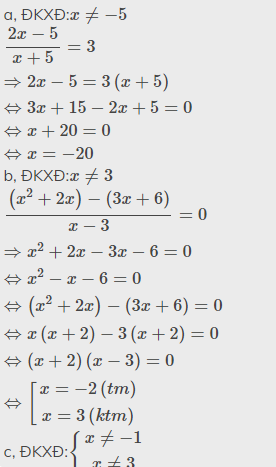giải phương trình: 2x(x-5)-(x+3)^2=3x-x(5-x)

Những câu hỏi liên quan
3.15 giải các phương trình sau :
a) ( x - 6 ) ( 2x - 5 ) ( 3x + 9 ) = 0
b) 2x( x - 3 ) + 5( x - 3 ) = 0
c) ( x^2 - 4 ) - ( x - 2 ) ( 3 - 2x ) =0
3.16 tìm m để phương trình sau có nghiệm :
x=-7 ( 2m - 5 )x - 2m^2 + 8
3.17 giải các phương trình sau :
a) ( 2x - 1 )^2 - ( 2x + 1 ) = 0
\(a,\left(x-6\right)\left(2x-5\right)\left(3x+9\right)=0\Leftrightarrow\left[{}\begin{matrix}x-6=0\Leftrightarrow x=6\\2x-5=0\Leftrightarrow x=\dfrac{5}{2}\\3x+9=0\Leftrightarrow x=-3\end{matrix}\right.\)
\(b,2x\left(x-3\right)+5\left(x-3\right)=0\Leftrightarrow\left(2x+5\right)\left(x-3\right)=0\Leftrightarrow\left[{}\begin{matrix}x-3=0\Leftrightarrow x=3\\2x+5=0\Leftrightarrow x=-\dfrac{5}{2}\end{matrix}\right.\)
\(c,x^2-4-\left(x-2\right)\left(3-2x\right)=0\Leftrightarrow\left(x-2\right)\left(x+2\right)-\left(x-2\right)\left(3-2x\right)=0\Leftrightarrow\left(x-2\right)\left(x+2-3+2x\right)=0\Leftrightarrow\left[{}\begin{matrix}x=2\\x=\dfrac{1}{3}\end{matrix}\right.\)
\(x=-7\left(2m-5\right)x-2m^2+8\Leftrightarrow x+7\left(2m-5\right)=8-2m^2\Leftrightarrow x\left(14m-34\right)=8-2m^2\)
\(ycđb\Leftrightarrow14m-34\ne0\Leftrightarrow m\ne\dfrac{34}{14}\)\(\Rightarrow x=\dfrac{8-2m^2}{14m-34}\)
\(3.17\Leftrightarrow4x^2-4x+1-2x-1=0\Leftrightarrow4x^2-6x=0\Leftrightarrow x\left(4x-6\right)=0\Leftrightarrow\left[{}\begin{matrix}x=0\\x=\dfrac{3}{2}\end{matrix}\right.\)
Đúng 2
Bình luận (0)
3.15:
a, \(\Leftrightarrow\left\{{}\begin{matrix}x-6=0\\2x-5=0\\3x+9=0\end{matrix}\right.\Leftrightarrow\left\{{}\begin{matrix}x=6\\x=\dfrac{5}{2}\\x=-\dfrac{9}{3}=-3\end{matrix}\right.\)
b, \(\Leftrightarrow\left(x-3\right)\left(2x+5\right)=0\)
\(\Leftrightarrow\left\{{}\begin{matrix}x-3=0\\2x+5=0\end{matrix}\right.\Leftrightarrow\left\{{}\begin{matrix}x=3\\x=-\dfrac{5}{2}\end{matrix}\right.\)
c, \(\Leftrightarrow\left(x-2\right)\left(x+2\right)-\left(x-2\right)\left(3-2x\right)=0\)
\(\Leftrightarrow\left(x-2\right)\left(x+2-3+2x\right)=0\)
\(\Leftrightarrow\left\{{}\begin{matrix}x-2=0\\3x-1=0\end{matrix}\right.\Leftrightarrow\left\{{}\begin{matrix}x=2\\x=\dfrac{1}{3}\end{matrix}\right.\)
3.16
\(\Leftrightarrow\left(2m-5\right).-7-2m^2+8=0\)
\(\Leftrightarrow-14m+35-2m^2+8=0\)
\(\Leftrightarrow-14m-2m^2+43=0\)
\(\Leftrightarrow-2\left(7m+m^2\right)=-43\)
\(\Leftrightarrow m\left(7-m\right)=\dfrac{43}{2}\)
\(\Leftrightarrow\dfrac{m\left(7-m\right)}{1}-\dfrac{43}{2}=0\)
\(\Leftrightarrow\dfrac{14m-2m^2}{2}-\dfrac{43}{2}=0\)
pt vô nghiệm
Đúng 1
Bình luận (0)
1) Giải các phương trình sau : a) x-3/x=2-x-3/x+3 b) 3x^2-2x-16=0 2) Giải bất phương trình sau: 4x-3/4>3x-5/3-2x-7/12
\(a,\dfrac{x-3}{x}=\dfrac{x-3}{x+3}\)\(\left(đk:x\ne0,-3\right)\)
\(\Leftrightarrow\dfrac{x-3}{x}-\dfrac{x-3}{x+3}=0\)
\(\Leftrightarrow\dfrac{\left(x-3\right)\left(x+3\right)-x\left(x-3\right)}{x\left(x+3\right)}=0\)
\(\Leftrightarrow x^2-9-x^2+3x=0\)
\(\Leftrightarrow3x-9=0\)
\(\Leftrightarrow3x=9\)
\(\Leftrightarrow x=3\left(n\right)\)
Vậy \(S=\left\{3\right\}\)
Đúng 1
Bình luận (0)
\(b,\dfrac{4x-3}{4}>\dfrac{3x-5}{3}-\dfrac{2x-7}{12}\)
\(\Leftrightarrow\dfrac{4x-3}{4}-\dfrac{3x-5}{3}+\dfrac{2x-7}{12}>0\)
\(\Leftrightarrow\dfrac{3\left(4x-3\right)-4\left(3x-5\right)+2x-7}{12}>0\)
\(\Leftrightarrow12x-9-12x+20+2x-7>0\)
\(\Leftrightarrow2x+4>0\)
\(\Leftrightarrow2x>-4\)
\(\Leftrightarrow x>-2\)
Đúng 1
Bình luận (0)
giải các phương trình sau
a) (3x+1)2-6(2x-7)(x-3)=0
b) (3x+1)(x-3)2=(3x+1)(2x-5)2
c) 0,75x(x+5)=(x+5)(3-1,25x)
a: =>9x^2+6x+1-6(2x^2-13x+21)=0
=>9x^2+6x+1-12x^2+78x-126=0
=>-3x^2+84x-125=0
=>\(x\in\left\{26.42;1.58\right\}\)
b: =>(3x+1)[(2x-5)^2-(x-3)^2]=0
=>(3x+1)(2x-5-x+3)(2x-5+x-3)=0
=>(3x+1)(x-2)(3x-8)=0
=>\(x\in\left\{-\dfrac{1}{3};2;\dfrac{8}{3}\right\}\)
c; =>(x+5)(0,75x-3+1,25x)=0
=>(x+5)(2x-3)=0
=>x=3/2 hoặc x=-5
Đúng 0
Bình luận (0)
Giải các phương trình sau: a. 2x-5/x+5=3
b. (x^2+2x)-(3x+6)/x-3=0
c. x/2(x-3)+x/2x+2=2x/(x+1)(x-3)
a, ĐKXĐ:\(x\ne-5\)
\(\dfrac{2x-5}{x+5}=3\\ \Rightarrow2x-5=3\left(x+5\right)\\ \Leftrightarrow3x+15-2x+5=0\\ \Leftrightarrow x+20=0\\ \Leftrightarrow x=-20\)
b, ĐKXĐ:\(x\ne3\)
\(\dfrac{\left(x^2+2x\right)-\left(3x+6\right)}{x-3}=0\\ \Rightarrow x^2+2x-3x-6=0\\ \Leftrightarrow x^2-x-6=0\\ \Leftrightarrow\left(x^2+2x\right)-\left(3x+6\right)=0\\ \Leftrightarrow x\left(x+2\right)-3\left(x+2\right)=0\\ \Leftrightarrow\left(x+2\right)\left(x-3\right)=0\\ \Leftrightarrow\left[{}\begin{matrix}x=-2\left(tm\right)\\x=3\left(ktm\right)\end{matrix}\right.\)
c, ĐKXĐ:\(\left\{{}\begin{matrix}x\ne-1\\x\ne3\end{matrix}\right.\)
\(\dfrac{x}{2\left(x-3\right)}+\dfrac{x}{2x+2}=\dfrac{2x}{\left(x+1\right)\left(x-3\right)}\\ \Leftrightarrow x\left(\dfrac{1}{2\left(x-3\right)}+\dfrac{1}{2\left(x+1\right)}-\dfrac{2}{\left(x+1\right)\left(x-3\right)}\right)=0\\ \Leftrightarrow x\left(\dfrac{x+1}{2\left(x-3\right)\left(x+1\right)}+\dfrac{x-3}{2\left(x+1\right)\left(x-3\right)}-\dfrac{4}{2\left(x+1\right)\left(x-3\right)}\right)=0\\ \Leftrightarrow x.\dfrac{x+1+x-3-4}{2\left(x-3\right)\left(x+1\right)}=0\\ \Leftrightarrow\dfrac{x\left(2x-6\right)}{2\left(x-3\right)\left(x+1\right)}=0\\ \Leftrightarrow\dfrac{2x\left(x-3\right)}{2\left(x-3\right)\left(x+1\right)}=0\\ \Leftrightarrow\dfrac{x}{x+1}=0\\ \Rightarrow x=0\left(tm\right)\)
Đúng 1
Bình luận (0)
Giải các phương trình sau a) 5-(x-6)=4(3-2x); b) 3 - x ( 1 - 3x)=5(1-2x); c) (x-3)(x+4)-2(3x-2)= (x-4)²
`5-(x-6)=4(3-2x)`
`<=>5-x+6-4(3-2x)=0`
`<=> 5-x+6-12 +8x=0`
`<=> 7x -1=0`
`<=> 7x=1`
`<=>x=1/7`
Vậy pt đã cho có nghiệm `x=1/7`
__
`3-x(1-3x) =5(1-2x)`
`<=> 3-x+3x^2=5-10x`
`<=> 3-x+3x^2-5+10x=0`
`<=> 3x^2 +9x-2=0`
\(\Leftrightarrow\left[{}\begin{matrix}x=\dfrac{-9+\sqrt{105}}{6}\\x=\dfrac{-9-\sqrt{105}}{6}\end{matrix}\right.\)
Vậy pt đã cho có tập nghiệm \(S=\left\{\dfrac{-9+\sqrt{105}}{6};\dfrac{-9-\sqrt{106}}{5}\right\}\)
__
`(x-3)(x+4) -2(3x-2)=(x-4)^2`
`<=>x^2+4x-3x-12- 6x +4 =x^2 -8x+16`
`<=>x^2-5x-8=x^2-8x+16`
`<=> x^2 -5x-8-x^2+8x-16=0`
`<=> 3x-24=0`
`<=>3x=24`
`<=>x=8`
Vậy pt đã cho có nghiệm `x=8`
Đúng 3
Bình luận (5)
a) 5-(x-6)=4(3-2x)
=> 5 – x + 6 = 12 – 8x
=> -x + 8x = 12 – 5 – 6
=> 7x = 1
=> x=1/7
Vậy phương trình có nghiệm x=1/7
b) 3 - x ( 1 - 3x)=5(1-2x)
=> 3-x+3x^2=5-10x
=> 3x^2+9x-2= 0
0=105
=> x =\(\dfrac{-9-\sqrt{105}}{6}\)
Đúng 0
Bình luận (0)
Giải phương trình sau:
a) x+3/x+1 + x-2/x = 2
b) 3x-2/x+7 = 6x+1/2x-3
c) 5/3x+2 = 2x-1
d) (2x+3) . (3x+8/2-7x + 1) = (x-5) . (3x+8/2-7x + 1)
Xem chi tiết
a) ĐKXĐ: \(x\notin\left\{-1;0\right\}\)
Ta có: \(\dfrac{x+3}{x+1}+\dfrac{x-2}{x}=2\)
\(\Leftrightarrow\dfrac{x\left(x+3\right)}{x\left(x+1\right)}+\dfrac{\left(x+1\right)\left(x-2\right)}{x\left(x+1\right)}=\dfrac{2x\left(x+1\right)}{x\left(x+1\right)}\)
Suy ra: \(x^2+3x+x^2-3x+2=2x^2+2x\)
\(\Leftrightarrow2x^2+2-2x^2-2x=0\)
\(\Leftrightarrow-2x+2=0\)
\(\Leftrightarrow-2x=-2\)
hay x=1(nhận)
Vậy: S={1}
b) ĐKXĐ: \(x\notin\left\{-7;\dfrac{3}{2}\right\}\)
Ta có: \(\dfrac{3x-2}{x+7}=\dfrac{6x+1}{2x-3}\)
\(\Leftrightarrow\left(3x-2\right)\left(2x-3\right)=\left(6x+1\right)\left(x+7\right)\)
\(\Leftrightarrow6x^2-9x-4x+6=6x^2+42x+x+7\)
\(\Leftrightarrow6x^2-13x+6-6x^2-43x-7=0\)
\(\Leftrightarrow-56x-1=0\)
\(\Leftrightarrow-56x=1\)
hay \(x=-\dfrac{1}{56}\)(nhận)
Vậy: \(S=\left\{-\dfrac{1}{56}\right\}\)
c) ĐKXĐ: \(x\ne-\dfrac{2}{3}\)
Ta có: \(\dfrac{5}{3x+2}=2x-1\)
\(\Leftrightarrow5=\left(3x+2\right)\left(2x-1\right)\)
\(\Leftrightarrow6x^2-3x+4x-2-5=0\)
\(\Leftrightarrow6x^2+x-7=0\)
\(\Leftrightarrow6x^2-6x+7x-7=0\)
\(\Leftrightarrow6x\left(x-1\right)+7\left(x-1\right)=0\)
\(\Leftrightarrow\left(x-1\right)\left(6x+7\right)=0\)
\(\Leftrightarrow\left[{}\begin{matrix}x-1=0\\6x+7=0\end{matrix}\right.\Leftrightarrow\left[{}\begin{matrix}x=1\\6x=-7\end{matrix}\right.\Leftrightarrow\left[{}\begin{matrix}x=1\left(nhận\right)\\x=-\dfrac{7}{6}\left(nhận\right)\end{matrix}\right.\)
Vậy: \(S=\left\{1;-\dfrac{7}{6}\right\}\)
d) ĐKXĐ: \(x\ne\dfrac{2}{7}\)
Ta có: \(\left(2x+3\right)\cdot\left(\dfrac{3x+8}{2-7x}+1\right)=\left(x-5\right)\left(\dfrac{3x+8}{2-7x}+1\right)\)
\(\Leftrightarrow\left(2x+3\right)\cdot\left(\dfrac{3x+8+2-7x}{2-7x}\right)-\left(x-5\right)\left(\dfrac{3x+8+2-7x}{2-7x}\right)=0\)
\(\Leftrightarrow\left(2x+3-x+5\right)\cdot\dfrac{-4x+6}{2-7x}=0\)
\(\Leftrightarrow\left(x+8\right)\cdot\left(-4x+6\right)=0\)(Vì \(2-7x\ne0\forall x\) thỏa mãn ĐKXĐ)
\(\Leftrightarrow\left[{}\begin{matrix}x+8=0\\-4x+6=0\end{matrix}\right.\Leftrightarrow\left[{}\begin{matrix}x=-8\\-4x=-6\end{matrix}\right.\Leftrightarrow\left[{}\begin{matrix}x=-8\left(nhận\right)\\x=\dfrac{3}{2}\left(nhận\right)\end{matrix}\right.\)
Vậy: \(S=\left\{-8;\dfrac{3}{2}\right\}\)
Đúng 1
Bình luận (0)
giải các phương trình sau
1/ 2 ( x-5) =(-x-5)
2/ 2(x+3)-3(x-1)=2
3/ 4(x-5) -(3x-1) =x-19
4, 7-(x-2) =5(2-3x)
5, 2x-(5-3x)=7x+1
1/ \(2\left(x-5\right)=\left(-x-5\right)\)
\(\Leftrightarrow2x-10=-x-5\)
\(\Leftrightarrow3x=5\)
\(\Leftrightarrow x=\dfrac{5}{3}\)
Vậy: \(S=\left\{\dfrac{5}{3}\right\}\)
==========
2/ \(2\left(x+3\right)-3\left(x-1\right)=2\)
\(\Leftrightarrow2x+6-3x+3=2\)
\(\Leftrightarrow-x=-7\)
\(\Leftrightarrow x=7\)
Vậy: \(S=\left\{7\right\}\)
==========
3/ \(4\left(x-5\right)-\left(3x-1\right)=x-19\)
\(\Leftrightarrow4x-20-3x+1=x-19\)
\(\Leftrightarrow0x=0\)
Vậy: \(S=\left\{x|x\text{ ∈ }R\right\}\)
===========
4/ \(7-\left(x-2\right)=5\left(2-3x\right)\)
\(\Leftrightarrow7-x+2=10-15x\)
\(\Leftrightarrow14x=1\)
\(\Leftrightarrow x=\dfrac{1}{14}\)
Vậy: \(S=\left\{\dfrac{1}{14}\right\}\)
==========
5/ \(2x-\left(5-3x\right)=7x+1\)
\(\Leftrightarrow2x-5+3x=7x+1\)
\(\Leftrightarrow-2x=6\)
\(\Leftrightarrow x=-3\)
Vậy: \(S=\left\{-3\right\}\)
[---]
Chúc bạn học tốt.
Đúng 0
Bình luận (0)
1. \(2\left(x-5\right)=-x-5\)
\(\Leftrightarrow3x=5\)
\(\Leftrightarrow x=\dfrac{5}{3}\)
Vậy \(S=\left\{\dfrac{5}{3}\right\}\)
2. \(2\left(x+3\right)-3\left(x-1\right)=2\)
\(\Leftrightarrow2x+6-3x+3=2\)
\(\Leftrightarrow x=7\)
Vậy \(S=\left\{7\right\}\)
3. \(4\left(x-5\right)-\left(3x-1\right)=x-19\)
\(\Leftrightarrow4x-20-3x+1-x+19=0\)
\(\Leftrightarrow0x=0\)
Vậy \(S=\left\{x\in R\right\}\)
4. \(7-\left(x-2\right)=5\left(2-3x\right)\)
\(\Leftrightarrow7-x+2-10+15x=0\)
\(\Leftrightarrow14x-1=0\)
\(\Leftrightarrow x=\dfrac{1}{14}\)
Vậy \(S=\left\{\dfrac{1}{14}\right\}\)
4. \(2x-\left(5-3x\right)=7x+1\)
\(\Leftrightarrow2x-5+3x-7x-1=0\)
\(\Leftrightarrow-2x-6=0\)
\(\Leftrightarrow x=-3\)
Vậy \(S=\left\{-3\right\}\)
Đúng 0
Bình luận (0)
1: Ta có: \(2\left(x-5\right)=\left(-x-5\right)\)
\(\Leftrightarrow2x-10+x+5=0\)
\(\Leftrightarrow3x=5\)
hay \(x=\dfrac{5}{3}\)
2: Ta có: \(2\left(x+3\right)-3\left(x-1\right)=2\)
\(\Leftrightarrow2x+6-3x+3=2\)
\(\Leftrightarrow-x=-7\)
hay x=7
3: Ta có: \(4\left(x-5\right)-\left(3x-1\right)=x-19\)
\(\Leftrightarrow4x-20-3x+1-x+19=0\)
\(\Leftrightarrow0x=0\)(luôn đúng
Đúng 0
Bình luận (0)
Xem thêm câu trả lời
bài 2 giải các phương trình sau
b,2(x+3)-4=0
d,5(x-3)=3x-5
f,7(5-x)=11-5x
h,2(3x-1)-3x=10
j,3-2x=3.(x+1)-x-2
m,4(2x-3)-5=6(3-x)-7
b)x+3=4:2
=> x=-1
d)5x-15=3x-5
<=> 5x-3x=15-5
<=> 2x=10
<=> x=5
f) 35-7x=11-5x
<=> 35-11=-5x+7x
<=> 24=2x
<=> x=12
Đúng 1
Bình luận (0)
h) 6x-2-3x=10
<=> 3x=10+2
<=> x=4
j)3-2x=3x+3-x-2
<=> 3-2x=2x+1
<=>-4x=-2
<=> x=1/2
Đúng 1
Bình luận (0)
giải các phương trình sau:
a.3(x-2)-10=5(2x + 1)
b.3x + 2=8 -2(x-7)
c.2x-(2+5x)= 4(x + 3)
d.5-(x +8)=3x + 3(x-9)
e.3x - 18 + x= 12-(5x + 3)
a. 3(x-2)-10=5(2x + 1)
<=> 3x - 6 - 10 = 10x + 5
<=> 3x - 10x = 5 + 6 + 10
<=> -7x = 21
<=> x = -3
b. 3x + 2=8 -2(x-7)
<=> 3x + 2 = 8 - 2x + 14
<=> 3x + 2x = 8 + 14 - 2
<=> 5x = 20
<=> x = 4
c. 2x-(2+5x)= 4(x + 3)
<=> 2x - 2 - 5x = 4x + 12
<=> 2x - 5x - 4x = 12 + 2
<=> -7x = 14
<=> x = -2
d. 5-(x +8)=3x + 3(x-9)
<=> 5 - x - 8 = 3x + 3x - 27
<=> -x - 3x - 3x = -27 + 8 - 5
<=> -7x = -24
<=> x = 24/7
e. 3x - 18 + x= 12-(5x + 3)
<=> 3x - 18 + x = 12 - 5x - 3
<=> 3x + x - 5x = 12 - 3 + 18
<=> -x = 27
<=> x = - 27
Đúng 1
Bình luận (0)
a. 3(x-2)-10=5(2x + 1)
<=> 3x - 6 - 10 = 10x + 5
<=> 3x - 10x = 5 + 6 + 10
<=> -7x = 21
<=> x = -3
b. 3x + 2=8 -2(x-7)
<=> 3x + 2 = 8 - 2x + 14
<=> 3x + 2x = 8 + 14 - 2
<=> 5x = 20
<=> x = 4
c. 2x-(2+5x)= 4(x + 3)
<=> 2x - 2 - 5x = 4x + 12
<=> 2x - 5x - 4x = 12 + 2
<=> -7x = 14
<=> x = -2
d. 5-(x +8)=3x + 3(x-9)
<=> 5 - x - 8 = 3x + 3x - 27
<=> -x - 3x - 3x = -27 + 8 - 5
<=> -7x = -24
<=> x = 24/7
e. 3x - 18 + x= 12-(5x + 3)
<=> 3x - 18 + x = 12 - 5x - 3
<=> 3x + x - 5x = 12 - 3 + 18
<=> -x = 27
<=> x = - 27
Đúng 1
Bình luận (0)
































